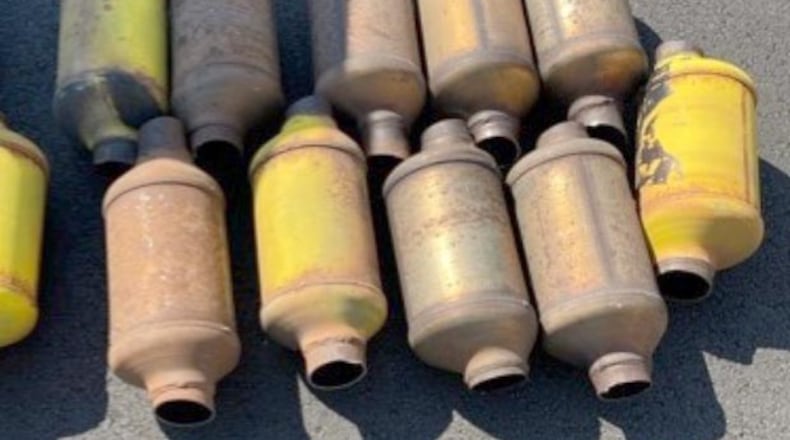As soon as he started his Subaru Outback, Jonathan Haas knew something was wrong.
“I started my car and it was extremely loud,” Haas told The Atlanta Journal-Constitution. “It’s that deep, bassy overwhelming sound. I put my foot on the gas and the car would shake.”
Someone had stolen the catalytic converter from his SUV, parked outside his Vinings apartment.
“It looked they knew exactly what they were doing,” Haas said. “You could see the saw marks. Gone overnight.”
It’s not a new crime. From 2008 through 2015, there were 25,394 catalytic converter thefts across the nation, according to The National Insurance Crime Bureau. Georgia was No. 5 among states for the most thefts.
A car’s catalytic converter is an exhaust control device. Thieves prize them for the trace amounts of precious metals such as platinum, rhodium or palladium that can be found inside. When metal prices soar, police agencies investigate an increase in thefts. Agencies across metro Atlanta are among those across the country reporting an increase in catalytic converter thefts.
Platinum is currently worth about $1,100 an ounce, up from $600 a year ago, according to Peter Cook, operations manager with Pirkle Inc. The Atlanta company specializes in scrap metal recycling. Palladium is worth about $2,300 an ounce, about $600 an ounce more than gold, according to APMEX, an online metal retailer.
“All of the metals, copper steal aluminum, everything has gone crazy,” Cook said. “We’re going to see all kinds of thefts, unfortunately.”
There isn’t a lot of precious metal in each catalytic converter, mostly a coating, Cook said.
“It’s a very small amount,” he said. “It takes a lot of catalytic converters to make an ounce.”
But with the right tools, that takes only minutes for thieves, according to police.
Georgia law prohibits recycling companies from buying catalytic converters without proof of where it came from or a vehicle title. Many recyclers don’t want to be involved with stolen metal, Cook said. But the thieves are still finding ways to profit.
Costly repairs
Local mechanics say replacing a catalytic converter can cost up to $2,000 to $3,000, depending on the type of car.
The owner of an Acworth muffler shop said repair costs can be even higher because thieves damage cars when swiping their catalytic converters.
Repairs on Haas’ Subaru cost about $3,000. He reported the theft to police and his insurance company paid the majority of the bill.
SUVs and other large trucks are more likely to be targeted for their catalytic converters, according to local mechanics. That’s because they sit higher off the ground, making it easier to get underneath them without a jack.
Hybrid vehicles, such as the Toyota Prius, are also prime targets, according to local mechanics. That’s because the metals inside the catalytic converters are usually in better condition.
Catching the thieves
It’s a challenging task for law enforcement agencies to find those responsible for the parts thefts. Sometimes, the crooks are caught red-handed.
While on patrol this week, a Forsyth County deputy spotted a man attempting to steal catalytic converters from delivery trucks parked outside a Tastycake outlet, according to the sheriff’s office. The man crashed his car into a curb and tried to run, but deputies caught him with the help of a police K-9, the department said.
Demetrice Frederick, 37, of East Point had several catalytic converters in the back of his SUV, the sheriff’s office said. Near the delivery trucks, investigators found more catalytic converters and a saw. Frederick was charged with theft by taking, fleeing, reckless driving, and driving with a suspended license.
Last month, a traffic stop in Clayton County led police to another suspect. On Feb. 20, an officer stopped Tomathias Beauford for a traffic violation, investigators said. Inside his car, authorities found drugs and approximately 50 catalytic converters.
Beauford, 27, of Jonesboro remained Friday in the Clayton jail, where he was being held on various charges including theft, obstruction, possession of tools during the commission of a crime, and possession of marijuana, records show.
Haas is not optimistic investigators will be able to find the person responsible for damaging his car. His complex doesn’t have surveillance cameras, which may have helped him avoid the hassle.
“I was angry,” Haas said. “I really hope it doesn’t happen again.”
PREVENTING CATALYTIC CONVERTER THEFTS
Local police agencies offered the following tips:
1. In public parking lots, park in well-lit areas when possible
2. Park in your garage if your home has one
3. Try to avoid leaving your car unattended for long periods of time
4. Remember that hybrid vehicles, pickups and SUVs are targeted most often
5. Consider having your catalytic converter welded in place by a mechanic
About the Author
Keep Reading
The Latest
Featured


